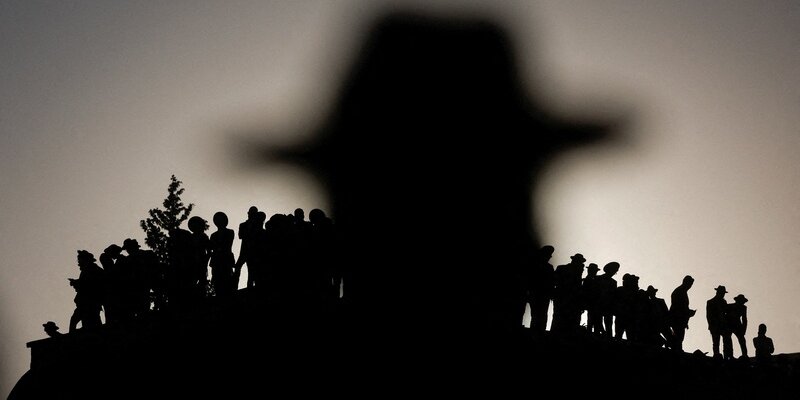Israeli Prison Service Promises Stricter Conditions for Palestinian Security Detainees
After the initial ‘euphoric’ response to the Hamas attack on Israel on the morning of October 7, silence fell over the facilities where Israel is holding 5,500 Palestinian security prisoners – who are desperate not to wreck any slim chance they have of seeing freedom. The Israel Prison Service is not taking any chances and has implemented emergency measures. ‘It’s in the prisoners’ interests to maintain the quiet, but you never know – so we’re taking measures to restrict contact and limit activities’


After the initial ‘euphoric’ response to the Hamas attack on Israel on the morning of October 7, silence fell over the facilities where Israel is holding 5,500 Palestinian security prisoners – who are desperate not to wreck any slim chance they have of seeing freedom. The Israel Prison Service is not taking any chances and has implemented emergency measures. ‘It’s in the prisoners’ interests to maintain the quiet, but you never know – so we’re taking measures to restrict contact and limit activities’

After the initial ‘euphoric’ response to the Hamas attack on Israel on the morning of October 7, silence fell over the facilities where Israel is holding 5,500 Palestinian security prisoners – who are desperate not to wreck any slim chance they have of seeing freedom. The Israel Prison Service is not taking any chances and has implemented emergency measures. ‘It’s in the prisoners’ interests to maintain the quiet, but you never know – so we’re taking measures to restrict contact and limit activities’
Palestinian prisoners in Ketziot prison, 2007. Photo: Reuters

Roni Singer
October 14, 2023
Summary


Listen to a Dynamic Summary of the Article
Created using NotebookLM AI tool
A deafening quiet has fallen over the facilities in which Israel holds Palestinian security prisoners. The kidnapping of at least 150 Israeli citizens – and that number keeps climbing – is the kind of lifeline that detainees from Hamas and Islamic Jihad could only have dreamed of, and they are worried that any activity on their part could endanger that. “It’s a cruel but unequivocal equation,” says one recently released security prisoner. “The inmates don’t care if children or old people have been murdered. They’re not happy and they’re not unhappy. They just want to get out. That’s the only thing that every security prisoner thinks about when they know that they have absolutely no other way of getting out.”
The Israeli Prison Service is not impressed with the quiet that has descended on the facilities housing Palestinian security prisoners and is doing everything it can to limit the risks by restricting the flow of information into the prisons, as well as limiting possible friction between the inmates and the guards. Last week, for example, authorities cut off power for all the electric appliances in the prisons, from televisions to hotplates. In addition, the number of outdoor hours granted to the prisoners was slashed, searches were conducted in the cells (guards were especially on the lookout for cell phones), and points of interaction between the inmates and the guards were reduced.
‘Restricted contact and limited activities’
Just hours after the outbreak of the war, the Prison Service began to prepare for the possibility of riots inside the prisons – and not just those housing security prisoners. Prison Service officials say that there were cries of celebration in some of the cell blocks housing Palestinians incarcerated for criminal activities. At the beginning of the week, they say, a security prisoner attacked a shift commander in a facility in the north and the Prison Service believes it was motivated by events in the south.
The worsening of conditions for security prisoners is, for the time being, a declared policy aimed at thwarting incidents inside the jails and cooperation with the outside world

“The security prisoners are in a state of euphoria. They feel empowered to do anything and they are in great spirits – so we are taking into account the possibility that there will be copycat actions,” one Prison Service official told Shomrim. “It is in the prisoners’ interests to maintain the quiet, of course, but you can’t predict what will happen so we are taking measures to restrict our contact with them and to limit activities.”
Although Hamas perpetrated the terrorist attack on the Israel-Gaza border, the Prison Service is not currently differentiating between security prisoners based on which organization they belong to; it has made toughened conditions across the board, especially given Hamas’ announcement that it would seek the release of prisoners from every faction in an exchange deal.
The worsening of conditions for security prisoners is, for the time being, a declared policy aimed at thwarting incidents inside the jails and cooperation with the outside world. Prison Service officials say it is not a permanent policy, but an emergency response to the situation.
One source involved in the Prison Service's decision-making process told Shomrim, “the prisoners were surprised by Hamas’ success. I’m certain that none of them ever thought something like this could happen. On the other hand, they recognize that something monumental has happened and they can see how their organization is looking out for prisoners. I think that they also understand that if they are not released, the reality of their lives will change fundamentally. The conditions enjoyed by security prisoners will not be as they once were.”

“The prisoners know that they have to be careful. Who knows, maybe one of the guards had a family member who was hurt there. I think that everyone in prison was shocked by the enormity of the incident. So many people kidnapped is something that no one ever envisaged.”
‘Everyone’s an expert in the prisons’
There are around 5,500 Palestinian security prisoners in Israeli jails. Most of them have been convicted and are serving prison terms; a minority are detainees or administrative detainees. Around half identify with the Fateh movement, a quarter with Hamas, and the rest with other organizations, such as Islamic Jihad or the Popular Front for the Liberation of Palestine.
News of the events of that black Saturday morning near the Israeli border with Gaza reached the prisons quickly. I., a released security prisoner who is still in contact with his friends behind bars, says that when news of what was happening reaches security prisoners in his former jail, there were cries of celebration and ‘Allahu Akbar!” Shortly thereafter, he adds, total silence fell over the prison. “Now the prisoners are especially cautious. No one will say a word and everyone is behaving perfectly so as not to anger anyone. But still, the happiest people you’ll find in the Middle East right now are the security prisoners.”
S. is a former security prisoner who was jailed in a different facility. He has also been in contact with prisoners still behind bars and his description of what happened there is different only in nuance. “I can’t say for sure that everyone was celebrating,” he says. “There are some prisoners who are humans first and foremost and the images of babies and old people being kidnapped was hard for them to see. But there were those who celebrated what, for them personally, could be an unexpected lifeline.” According to S., once the prisoners understood exactly what was happening, a silence descended in the prison “so as not to ruin the hope.”
Another security prisoner claims that there were no expressions of celebration, but for very different reasons: “It didn’t happen because the prisoners know that they have to be careful. Who knows, maybe one of the guards had a family member who was hurt there. I think that everyone in prison was shocked by the enormity of the incident. So many people kidnapped is something that no one ever envisaged.”

Ben-Gvir Schadenfreude
Other former security prisoners who spoke to Shomrim talk about the tension created by any event that could have an impact on their early release. Speaking about the previous round of prisoner-exchange negotiations between Israel and Hamas in 2013 and 2014, for example, one of them says that “tension inside the prison was huge. The prisoners were like GPS systems tracking the location of the American representative to the talks; now he’s on a plane to Spain, now he’s flying above Italy. They held their breaths until they heard that there had been progress in the talks.”
Another former security prisoner says that any protest or comments about securing the release of Israelis held in Gaza – until last week, Hamas held two living Israeli hostages and the body of Hadar Goldin – was of huge interest to the prisoners. “They would talk about it, try and understand what it all meant for the prisoners and whether it meant they would be getting out any sooner,” he says. He adds that, once there were reports of progress in talks for the release of Gilad Shalit, the security prisoners maintained total silence “so as not to ruin anything.”
One predictable point that was raised by the security prisoners is the sense of Schadenfreude they feel with regard to National Security Minister Itamar Ben-Gvir, whom they refer to as the “Pita Minister” [after in February, Ben-Gvir banned Palestinian security prisoners from baking their own pita bread in an attempt to harsher their living conditions RS]. They have many complaints about his policy of worsening their conditions, his visit to the Temple Mount, and so on, so they take delight in his misfortune. “The minister who most wanted to harm the security prisoners,” one of them said, “will find himself freeing more of them than ever before.”













